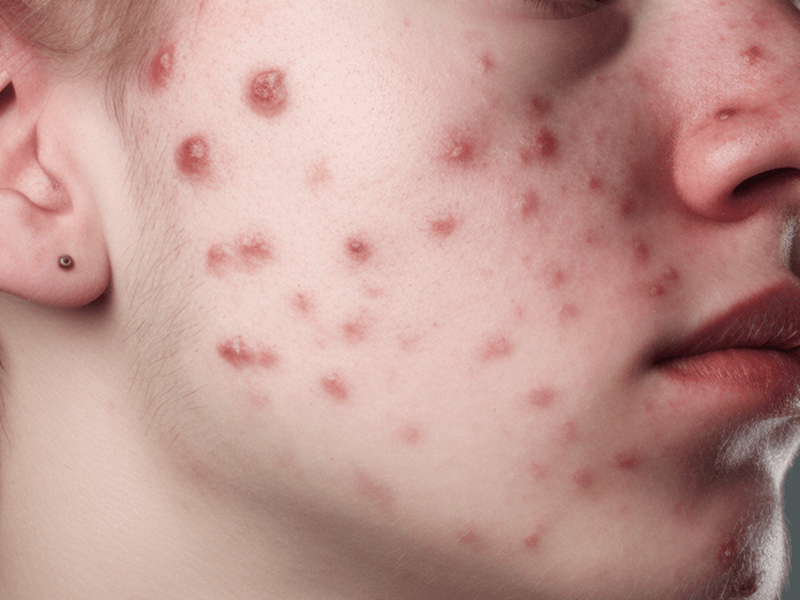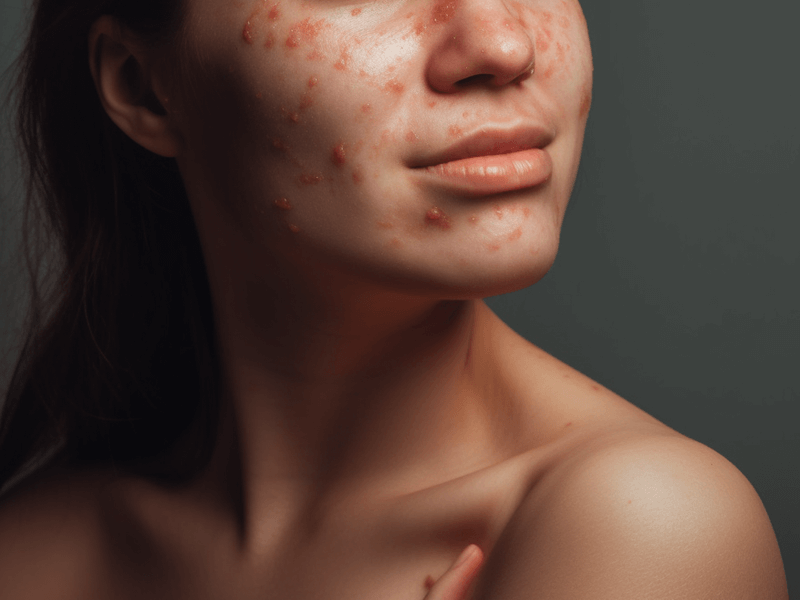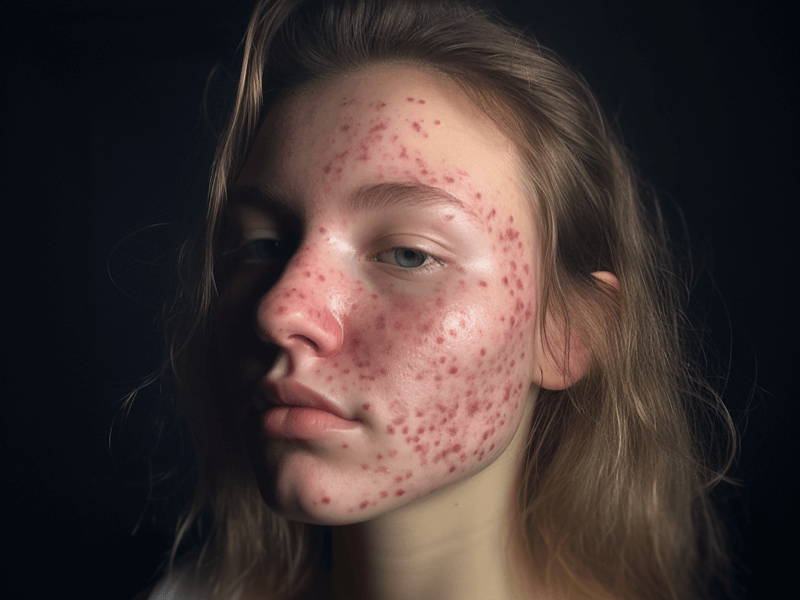Cystic acne is a profound and often painful variety of acne that can be both physically and emotionally distressing. If you’ve ever struggled with this stubborn condition, you know how frustrating it can be to find effective treatment options. In this comprehensive guide, we’ll delve deep into the world of cystic acne, covering everything from its causes to the most advanced treatment methods. Whether you’re dealing with cystic acne yourself or simply want to learn more about it, this article is worth reading. We’ll provide you with the knowledge you need to better understand and manage this challenging skin condition.
Content Index
ToggleWhat Is Cystic Acne?
Cystic acne is a severe type of acne that is characterized by the development of deep, painful, and often inflamed cysts or nodules beneath the skin’s surface. Unlike typical pimples or blackheads, cystic acne lesions are larger and can linger for weeks or even months. These cysts are filled with pus and can be extremely tender to the touch.
Cystic acne typically occurs when hair follicles become clogged with dead skin cells and an excess of oil. This combination creates an ideal environment for the proliferation of acne-causing bacteria. As a result, cystic acne tends to be more inflammatory and stubborn than other types of acne.
What Cause Cystic Acne? Most Common Cystic Acne Causes
Understanding the underlying causes of cystic acne is crucial for effective treatment. Several factors contribute to the development of this severe type of acne:
- Excess Oil Production: Excessive oil production by the skin’s sebaceous glands can clog hair follicles and lead to the formation of cysts.
- Dead Skin Cells: The accumulation of dead skin cells on the skin’s surface can block pores and contribute to the development of cystic acne.
- Acne Bacteria: The presence of Propionibacterium acnes, a type of bacteria that plays a role in the development of acne, can worsen cystic acne.
- Hormonal Fluctuations: Hormonal changes, such as those that occur during puberty, pregnancy, or menstrual cycles, can trigger or exacerbate cystic acne.
- Genetics: A family history of acne can increase the likelihood of developing cystic acne.

Other Types of Acne
In the world of dermatology, cystic acne is a type of inflammatory acne that stands out as the most severe and demanding to manage. However, it’s important to note that there are several other variants of acne that individuals may encounter. These different types of acne share some similarities with cystic acne but also have their distinct characteristics and considerations when it comes to treatment.
- Nodular Acne: Similar to cystic acne, nodular acne is a severe type of inflammatory acne that results in large, painful acne nodules. It often requires specific treatment.
- Pustular Acne: Pustular acne is characterized by pus-filled lesions on the skin, which can be painful and inflammatory. It may not always be as severe as cystic acne, but still requires attention.
- Acne Cysts and Nodules: This category includes both cystic and nodular acne, both of which involve the development of larger, painful acne lesions beneath the skin’s surface.
- Acne Papules: Papules are smaller, raised, and tender bumps on the skin that result from inflammatory acne. They can coexist with other kinds of acne, including cystic acne.
Understanding these different types of acne is crucial because each may require a unique approach to treatment. Finding the right therapy option is essential to reduce acne appearance and manage discomfort. If you have any form of acne, consider consulting a dermatologist to determine the most suitable treatment plan based on your specific condition and needs.
Cystic Acne Treatment: Choose the Best Treatment Options
Treating cystic acne can be challenging, but there are several effective approaches to consider. It’s important to note that what works for one person may not work for another, so it may take some trial and error to find the best treatment for your individual case. Here are some treatment possibilities to explore:
- Over-the-Counter Products: Start with topical treatments containing ingredients like benzoyl peroxide, salicylic acid, or sulfur. These can help reduce inflammation and kill acne-causing bacteria.
- Prescription Medications: If over-the-counter products don’t provide relief, consult a dermatologist. They may prescribe antibiotics, oral contraceptives (for hormonal acne), or isotretinoin (Accutane) for severe cases.
- Lifestyle Changes: Maintain a healthy skincare routine, including gentle cleansing and moisturizing. Avoid picking or squeezing cystic acne marks, as this can worsen scarring.
How to Prevent Acne Cyst
Preventing cystic acne can be challenging, but certain measures can help reduce the risk of breakouts. Here are some tips:
- Cleanse Regularly: Use a gentle cleanser to remove excess oil and dead skin cells without over-drying your skin.
- Avoid Harsh Products: Steer clear of harsh skincare products that can irritate your skin and worsen acne.
- Limit Makeup: Use non-comedogenic makeup products that won’t clog pores.
- Manage Stress: Stress can exacerbate acne, so practice stress-reduction techniques such as yoga, meditation, or deep breathing.
Understanding Acne Scarring
One of the most concerning aspects of cystic acne is the potential for scarring. Cystic acne lesions are deep and can leave behind permanent marks on the skin. There are different variations of acne scars, including atrophic (indented) scars, hypertrophic (raised) scars, and post-inflammatory hyperpigmentation (dark spots).
To reduce the risk of scarring, it’s crucial to avoid picking or squeezing cystic acne spots. If you already have acne scars, various treatments, such as laser therapy, chemical peels, and microneedling, can help improve their appearance.
Over-the-Counter Products for Severe Form of Acne Cysts
If you’re looking for over-the-counter products to help manage your cystic acne, there are several options to consider. These products can be effective in reducing inflammation and killing acne-causing bacteria.
Remember that consistency is key when using over-the-counter products. It may take a few weeks to see significant improvement, so be patient and follow the instructions on the product labels.

When to Consult a Dermatologist to Get Rid of Cystic Acne
While over-the-counter products can be helpful for some, they may not provide the desired results for severe cystic acne. If you’re experiencing persistent, painful cysts or if your acne is significantly affecting your self-esteem, it’s time to consult a dermatologist. Dermatologists are medical experts specializing in skin conditions and can offer a range of care options tailored to your specific needs.
Treat Your Cystic Acne with Acne Laser Treatment at Hortman Clinics
Are you tired of dealing with the relentless agony of cystic acne breakouts? Cystic acne is an intense type of inflammatory acne that can cause not only physical discomfort but also leave behind stubborn acne scarring. For those who suffer from cystic acne, finding an effective treatment plan is crucial.
At Hortman Clinics, we understand the challenges that people with cystic acne face. Cystic acne is the most serious and painful variety of acne, characterized by acne nodules and acne cysts that are larger than typical acne papules. If left untreated, cystic acne can lead to unsightly acne scars and have a significant impact on your overall skin condition.
Our state-of-the-art acne laser treatment is a game-changer when it comes to cystic acne. Unlike other treatment choices that may have adverse effects or fail to deliver satisfying results, our laser therapy specifically targets the root causes of cystic acne. By harnessing the power of advanced technology, we can reduce the appearance of acne sores, stimulate deeper dermal layers to regenerate, and help treat cystic acne effectively.
Cystic acne tends to develop when acne bacteria multiply within the hair follicles, leading to the formation of painful acne nodules and cysts. Our laser treatment for cystic acne directly addresses these underlying causes, providing you with a comprehensive solution to your acne woes.
At Hortman Clinics, we offer a variety of treatment alternatives tailored to your unique needs. We work closely with our patients to develop a customized treatment plan that works best for them. Whether you’ve been struggling with cystic acne for a while or are just beginning to develop acne, it’s essential to address it as soon as possible. Don’t let cystic acne continue to affect your life; take control of your skin’s health today.
Our expert dermatologists are here to help you find a treatment that works, so you can finally clear up acne and prevent further cystic acne breakouts. We understand that cystic acne is a grave and painful kind of acne that can affect your self-esteem and overall well-being. Let us assist you in your journey to smoother, clearer skin.
Prescription Medications for Treatment for Cystic Acne
Dermatologists have access to a wide range of prescription medications that can effectively treat cystic acne. These options include:
- Oral Antibiotics: Medications like doxycycline or minocycline can help reduce inflammation and control bacteria.
- Hormonal Treatments: For women with hormonal acne, oral contraceptives or anti-androgen medications may be prescribed.
- Isotretinoin (Accutane): This powerful medication is reserved for severe cases of cystic acne. It reduces oil production, shrinks oil glands, and can provide long-term relief.
Your dermatologist will evaluate your condition and medical history to determine the most appropriate treatment plan for you.
Lifestyle Changes to Help Treat Cystic Acne
In addition to medical treatments, making some lifestyle changes can help manage cystic acne and promote overall skin health. Here are some tips:
- Diet: Maintain a balanced diet rich in fruits, vegetables, and whole grains. Limit dairy and sugary foods, which may contribute to acne.
- Hydration: Drink plenty of water to keep your skin hydrated and flush out toxins.
- Sleep: Aim for 7-9 hours of quality sleep each night to support skin regeneration.
- Avoid Touching Your Face: Keep your hands away from your face to prevent the transfer of bacteria.
Cystic Acne: The Bottom Line
Cystic acne is a challenging condition, but with the right treatment and care, it can be managed effectively. Remember that finding the best approach for your skin may take time, so be patient and consult a dermatologist for guidance if needed. By understanding the causes, healing options, and preventive measures for cystic acne, you can take proactive steps towards clearer and healthier skin.
In Summary of Cystic Acne Develop
- Cystic acne is a severe form of acne characterized by deep, painful cysts.
- It is caused by factors such as excess oil production, dead skin cells, and acne bacteria.
- Treatment options include over-the-counter products, prescription medications, and lifestyle changes.
- Preventing cystic acne involves maintaining good skincare practices and managing stress.
- Avoid picking or squeezing cystic acne to prevent scarring.
- Consult a dermatologist for severe or persistent cystic acne.
- Prescription medications may include oral antibiotics, hormonal treatments, or isotretinoin (Accutane).
- Lifestyle changes like a balanced diet, hydration, and good sleep can support cystic acne management.
- With patience and the right approach, cystic acne can be effectively treated, leading to clearer and healthier skin.


